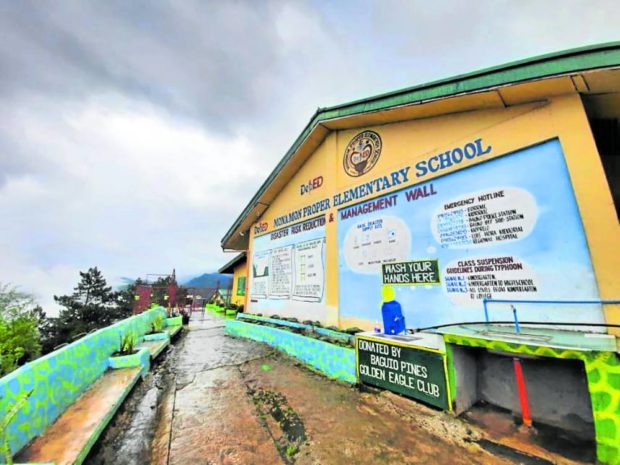Distance learning still needed in Cordillera, say DepEd, DICT execs

REMOTE SCHOOL | Monamon Proper Elementary School is built within a vegetable farming community in Bauko town, Mountain Province. A team from the Department of Education inspected the school this week to assess its preparations for the new school term that begins in August. (Photo by CARLITO DAR / Contributor)
BAGUIO CITY, Benguet, Philippines — Now that a return to in-person classes is mandatory, Cordillera educators and government information technology officials believe hybrid classes that combine digital and physical classroom instructions must be retained for remote mountain areas.
During a Regional Development Council (RDC) briefing on Wednesday, Reynato Parnacio, Cordillera director of the Department of Information and Communications Technology (DICT), said the government must continue improving and utilizing digital technology in the region’s schools for the coming academic term.
On Tuesday in Mountain Province, Estela Cariño, the Department of Education (DepEd) regional director, said technology had provided “out-of-the-box” solutions to problems in the region, like the shortage of schools and classrooms and the vast distance between students’ homes and schools because of the mountainous terrain.
“Why do we need to let learners walk 2 kilometers to school if all we let them do is answer seatwork and then let them go home? Full [in-person classes] should not mean learners have to go to school every day,” she said during a press conference held at Bauko town.
Project Hyteq
Cariño added: “Put the homework on computer tablets and let them answer [this] at home so they come to school to discuss the [assignment]. This means they can only be in school for two or three days.”She discussed a Cordillera initiative called Project Hyteq (Hybrid Learning using Technology with Equity and Quality) which combines a digital management system and information technology that have been retooled for Cordillera teachers, as well as for schools with no internet access.
Saying government teachers “learned a lot from the pandemic,” Cariño said Hyteq and other alternative education tools should not be discarded even with the resumption of in-person classes.
Dead spots
Parnacio agreed, saying the hybrid educational system should be retained on a case-by-case basis for the region, particularly in periods when natural disasters — like typhoons, flash floods, landslides — strike.
But he stressed that physical classroom sessions are still ideal for students who endured two years of distance learning because of the quarantines that kept them restricted at home.
Parnacio said the RDC infrastructure committee had asked private telecommunications companies to provide them with details about their networks and service areas in the Cordillera to determine which areas needed improved cellular access.
Cordillera towns have internet access, but many communities in the mountain region are “dead spots,” said Philip Labarinto, the National Economic and Development Authority representative to the infrastructure committee.
DICT services and infrastructure are moving out of Baguio, and are nearing Bontoc town in Mountain Province, Ifugao, and even Abra. Bontoc is being developed as another government IT hub like Baguio.
—VINCENT CABREZA
RELATED STORIES
Cordillera eyeing limited physical classes to cut costs
DepEd eyes break for Cordillera teachers before in-person classes resume